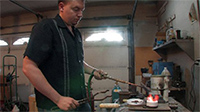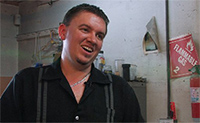E-waste Investigation, Part 4:
From motherboard to wedding ring: Turning a profit with e-waste gold
One Fort Collins man shocks regulators
by Kristin Jones (I-News Network), Daily Camera
Part 1, Part 2, Part 3, Part 4
 |
 |
 |
 |
| |
 |
|
| |
David Emslie, 32, demonstrates at his Fort Collins home how he refines gold that others have extracted from computers. |
|
 |
 |
 |
| |
 |
|
| |
David Emslie, 32, talks at his Fort Collins home about the processes he uses to refine gold that others have extracted from computers into a purified metal for his custom jewelry work.
Photos: Daily Camera |
|
 |
 |
 |
|
| |
22 November 2010 – For some in Colorado, refining gold from electronic scrap isn't just a hobby. It's also a business.
Meet David Emslie. He buys and sells gold from his house in Fort Collins, inviting regular traffic from collectors, hobbyists and gold bugs.
Emslie, 32, is one of the few to turn a profit from e-scrap. He takes the gold others have extracted from computers -- he finds it's not worth the trouble to do it himself -- and combines it with the gold from jewelry, ore and even dental fillings.
In a rental space north of Fort Collins, Emslie uses a highly potent acid solution known as aqua regia to re-refine the gold. He didn't let reporters see this operation, both because of the toxic fumes and because of a fear of being robbed, he said.
His refining operation, which he calls PG&G Refining, is no secret. He advertises online. But when told of his practices, several local and national watchdogs seemed shocked.
"Aqua regia? Where, in Colorado? Oh my God, that's incredible," said Sarah Westervelt.
As the e-Waste Project Coordinator at the Seattle environmental organization Basel Action Network, Westervelt has documented aqua regia's use in toxic e-waste dumps in places like China and Nigeria. Just not in the U.S.
Emslie says his operation is perfectly safe and legal. He uses a fume hood to divert the toxic gases, neutralizes the waste acid and carefully collects leftovers like mercury, cadmium and lead that he removes from the gold.
Plus, he works with small quantities.
A natural craftsman, Emslie also taught himself an obscure technique of metal-crafting called mokume gane, which has its roots in ancient Japan. In his garage, he bends metal into rings and other jewelry with impossible-looking wood grain patterns.
"I have a very interesting job," says Emslie. "I make metals do things they don't want to do."
Some of the rings find their way to a brightly lit shop on College Avenue in Fort Collins, where they sell for $750 and up. Darvier Jewelers draws heavy foot traffic from college students and other young clients shopping for custom wedding rings. During the recession, owner Timothy White began stressing that his custom rings use only recycled metal; last year he brought in his best sales since the shop opened three years ago.
Customers like to bring in old family necklaces and rings, making up the bulk of the raw material for the rings. The other part comes from sources as unexpected as catalytic converters, and of course Emslie's mixture including e-scrap. White tests the purity of the precious metal in the jewelry, so he knows it's non-toxic and safe to wear.
"The sentimental value is the most important thing to the clients," says White. As for the source of the rest of the metal, he says: "They don't ask."
Told that regulators and watchdogs were surprised to hear of his processes, Emslie said they misunderstand his methods.
"Recycling is a necessary thing in this world," he said. If e-waste isn't recycled here at home, he added, "then it goes to places like China and Mexico ... places that just don't care."
I-News in a nonprofit investigative news network.
FAIR USE NOTICE. This document contains copyrighted material whose use has not been specifically authorized by the copyright owner. The Basel Action Network is making this article available in our efforts to advance understanding of ecological sustainability and environmental justice issues. We believe that this constitutes a 'fair use' of the copyrighted material as provided for in section 107 of the US Copyright Law. If you wish to use this copyrighted material for purposes of your own that go beyond 'fair use', you must obtain permission from the copyright owner.
More News
|